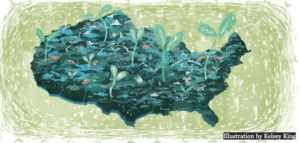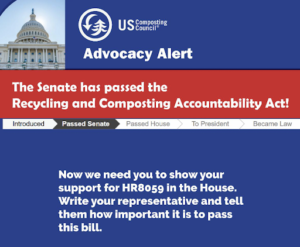
Update and Advocacy Alert!
 Good news! The U.S. Senate passed the Recycling and Composting Accountability Act on July 28, 2022. ICCT supported the bill when we hosted an April 2022 webinar presented by the U.S. Composting Council and attended by 50 people. Ask your House member to support this bill using this easy-to-navigate link.
Good news! The U.S. Senate passed the Recycling and Composting Accountability Act on July 28, 2022. ICCT supported the bill when we hosted an April 2022 webinar presented by the U.S. Composting Council and attended by 50 people. Ask your House member to support this bill using this easy-to-navigate link.
Worldwide, about 33% of soil is degraded. In the United States, soil is disappearing 10 times faster than it’s being replenished naturally. Composting helps build healthy soils and increases the ability of soils to store carbon thereby combating global warming while protecting water resources, increasing agricultural productivity, and increasing food production.
People and communities of faith can help bring composting to scale in our country! Congress Can Act on Composting, an ICCT 2022 webinar, features Frank Franciosi (US Composting Council), Muriel Williman (NC Composting Council), and Rev. Susannah Tuttle (NC Interfaith Power & Light). You can find webinar and advocacy resources here:
- Contact your U.S. House member to pass HR8059, the
companion to S3743 that passed the Senate in July 2022. - Webinar recording,
- Power Point Presentation by Frank Franciosi,
- Talking points from the presentation,
- ICCT Statement on Composting Policy, and
- Online advocacy tool from Susannah Tuttle and Interfaith Power & Light that includes both bills described below.
With this online advocacy tool you can, in short order, urge your members of Congress to support two bills that will advance composting (see bill descriptions below). By simply entering your address, the tool will automatically generate a call, an email, or a tweet to your own members of Congress (both Senators and your Representative). There’s a sample phone script, an email message, and a tweet, all of which can be changed to better reflect your ideas.
If you want to learn more about composting and the legislation before contacting your members of Congress, you can watch a briefing by top experts recorded at the ICCT April 2022 webinar.
These two bills on composting have been introduced in the 117th Congress (2021-22) and they are seen by US Composting Council as being complementary.
- The Federal Recycling and Composting Accountability Act, introduced by Sen. Tom Carper (D – Delaware) and Sen. John Boozman (R – Arkansas), would put federal focus on collecting data on existing recycling and composting infrastructure in the U.S. More information from USCC.
- The Compost Act, H.R. 4443 and S 2388, would require the designation of composting as a conservation practice which will make compost use an eligible reimbursement item for farmers who use compost to improve soil and sequester carbon. It would provide at least $200 million/year through 2030 in grants and loan guarantees for composting facilities and programs for equipment, siting, and systems needed to expand compost facilities accepting food scraps, both public and private, for collection programs and for development of markets, which are critical for the success of the industry. More information from the Institute for Local Self-Reliance.
ICCT supports the overall goals and most of the provisions of these bills with one exception. We are concerned about the provision in the Compost Act for loan guarantees to farmers and ranchers with prior experience with compost facilities.
ICCT has an operating principle that states, “We recognize that low-income people and people of color are disproportionately affected by environmental abuses and the changing climate. We will work to decrease the negative impacts on these groups and enable their participation in jobs and other benefits that solutions bring.”
ICCT is concerned that restricting the loan guarantees to those with prior experience with compost facilities may disadvantage small farmers and farmers of color.
ICCT would like to see a change in the bill’s language to ensure that small farmers and farmers of color will be able to participate in jobs and other benefits that the solutions provided in the bill will bring.
Special thanks to Carl Sigel (NC Composting Council) for planning the webinar. The webinar was hosted by Interfaith Creation Care of the Triangle and was cosponsored by the NC Council of Churches, Orange-Chatham Interfaith Care for Creation, the Episcopal Diocese of NC, the Carolina Farm Stewardship Association, Toward Zero Waste, and Pachamama RTP.




